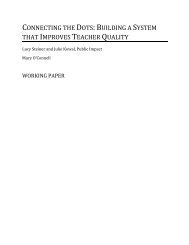Using Competency-Based Evaluation to Drive Teacher Excellence
Using Competency-Based Evaluation to Drive Teacher Excellence
Using Competency-Based Evaluation to Drive Teacher Excellence
Create successful ePaper yourself
Turn your PDF publications into a flip-book with our unique Google optimized e-Paper software.
<strong>Using</strong> <strong>Competency</strong>-<strong>Based</strong> <strong>Evaluation</strong><br />
<strong>to</strong> <strong>Drive</strong> <strong>Teacher</strong> <strong>Excellence</strong><br />
Lessons from Singapore<br />
By Lucy Steiner<br />
The United States’ education system needs<br />
<strong>to</strong> take its critical next step: fairly and accurately<br />
measuring teacher performance.<br />
Successful reforms <strong>to</strong> teacher pay, career advancement,<br />
professional development, retention, and other<br />
human capital systems that lead <strong>to</strong> better student<br />
outcomes depend on it. Where can the U.S. find the<br />
best-practice know-how for this To start, it should<br />
look <strong>to</strong> nations that have revamped teacher performance<br />
measurement <strong>to</strong> sustain teaching excellence,<br />
and Singapore offers a remarkable example.<br />
In the early 2000s, the small but racially and economically<br />
diverse nation of Singapore designed and<br />
implemented a new, performance-linked method of<br />
measuring teacher effectiveness that enables measurement<br />
of teachers in all subjects and grades. Singapore<br />
had already developed a high-performing education<br />
system. But as global economic opportunities for<br />
its citizens increased, it needed <strong>to</strong> ensure continued<br />
recruitment, retention, and performance of talented<br />
teachers. Today, Singapore’s students consistently<br />
perform at the <strong>to</strong>p of internationally comparable<br />
exams,1 and 98 percent of Singapore’s sixth-grade<br />
students achieve math standards more rigorous than<br />
the eighth-grade standards on the U.S. NAEP exam<br />
(National Assessment of Educational Progress).2<br />
Think of it this way: many of Singapore’s lowerachieving<br />
students are learning at levels higher than<br />
gifted-student curricula in U.S. schools.3 Singapore,<br />
Many of Singapore’s lower-achieving<br />
students are learning at levels higher than<br />
gifted-student curricula in U.S. schools.<br />
while much smaller than the United States, compares<br />
in size <strong>to</strong> some of our states and largest cities,<br />
not one of which is on a path <strong>to</strong> achieve for children<br />
what Singapore has.<br />
What can we learn from Singapore Much, it<br />
seems, and Singapore knows it. The complete recipe<br />
for its educational success is not public, and determining<br />
the ingredients in the secret sauce is a challenge.<br />
But one element stands out: the development<br />
and thorough use of performance-linked “competencies”<br />
<strong>to</strong> measure, reward, and develop teacher<br />
performance. Education leaders take note: we’re not<br />
even close in the U.S., and yet similar systems and accompanying<br />
practices are within reach of any motivated<br />
leader who wants <strong>to</strong> achieve and sustain results<br />
like Singapore’s. This paper provides a launching<br />
point. Here we present a brief background on the<br />
state of teacher evaluation in the United States, the<br />
case for why we can learn much from Singapore,<br />
and key facts about Singapore’s competency-based<br />
teacher evaluation system.<br />
www.opportunityculture.org lessons from singapore | 1





